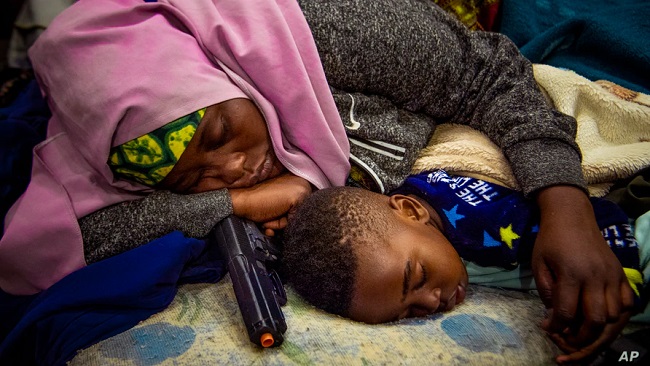Cameroon Appreciates End to Toy Weapon Gifts
Cameroon rights groups and activists say they are gratified that for the first time since 2016, parents no longer give children and teenagers toy guns as gifts during end-of-year feasts. In 2016, rights groups launched a campaign to ban toy guns, mostly imported from China, saying they lead to violence. Alternative gifts for children include educational electronic toys.
An educational electronic toy in the form of an electronic workbook helps five children in Cameroon’s capital, Yaounde, learn the letters of the alphabet and how to recognize and spell words. Six-year-old Christina Marfaw says her parents gave her the toy as a gift for the New Year.
“It is a touch and teach workbook that our parents bought for us,” said Marfaw.
“The book is asking us to find something that begins with the letter ‘R.’
In the past it was normal for many parents to give toy guns as gifts to little children like Marfaw.
Educational toys like this one have replaced toys like guns, knives and military vehicles that were in high demand and widely used as gifts for Cameroon’s children.
In 2016, Cameroon rights groups and activists started advocating for a ban on toy guns, most of which were imported from China. China is the largest producer and distributor of toys, especially toy guns, in Cameroon.
Last year, during the deepening Anglophone separatist crisis and Boko Haram terrorism on the northern border with Nigeria, the rights groups began urging Cameroonians not to buy children toy guns.
Activist and gender expert Irene Chinje is among those who pushed to stop toy gun sales. She says it breeds violence.
“It signifies violence. Children do not know the difference between it being a toy gun and the significance it carries,” Chinje said. “They just see it as a sign of bravery for them, and so if they can handle the toy gun, then they are encouraged in the future to handle the real weapon with bullets. They can use it in any careless manner. We do not have to encourage children with guns as toys. If we have to stop violence, we start from that youthful age. We must make the children understand that it is something which could in the future impact something very harmful. We have realized even people of the underworld use the toy guns, but you cannot identify it because you do not even have the courage to look at it when you see them stand before you.”
Chinje says societies have ethics, so people should avoid toys that seem to encourage violence and consider ethics in their choice of toys.
She says she is happy that Cameroonians are also avoiding toys that promote gender bias.
“We do not give girls those doll babies that we used to give because it makes them feel that they are girls, they have to cater for babies,” Chinje said. “So, no. We are trying to give what is more gender balanced to children”
Chinje and some activists have been visiting markets to express their appreciation to Cameroonians for not buying toy guns.
Twenty-four-year-old Kum Yannick, a student at the university of Buea, is in a supermarket in Yaounde to buy gifts for his teenage siblings. He says he wants to buy and share books and toys that promote peace.
“As the new year 2021 is approaching, the wish of all Cameroonians is that peace should return in the troubled regions, and what I have to share is a message of goodwill and love, which I think the Bible is the key from which I shall have all these messages that I am going to share,” Yannick said.
Cameroon has always blamed the over-involvement of teenagers in crime on what they watch on TV, and some there say the sharing of toy guns as gifts promotes violence, especially during New Year’s celebrations.
The crossover from an old to a new year is always widely celebrated in Cameroon, with Christians, Muslims and animists sharing gifts and exchanging visits. This year, gifts that promote violence are not found in the markets.
Source: VOA





